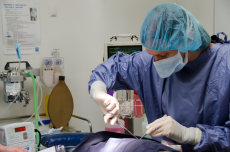Anaesthesia, Monitoring and Pain Management
At Whangaparaoa Veterinary Centre most patients receive a preanaesthetic injection which includes pain relief and sedation. They then receive an intravenous anaesthetic to induce anaesthesia. This is safe and offers a fast and smooth recovery. Once asleep they are intubated (insertion of a tube into the windpipe). This allows careful control of safe anaesthetic depth with a gas called isoflurane.
A qualified Veterinary Nurse is constantly monitoring the patient. This is aided by advanced monitoring equipment that can give us feedback on critical vital signs such as core temperature, respiration rate, heart rate, ECG pattern, oxygen levels in the blood. With this technology we can pick up changes before they become serious.
Our clinic strongly believes in quality pain relief for our pets. As a result all our patients receive pain relief before and after surgery. Pain relief medication may also need to be given at home. Good pain relief means a quicker recovery.










